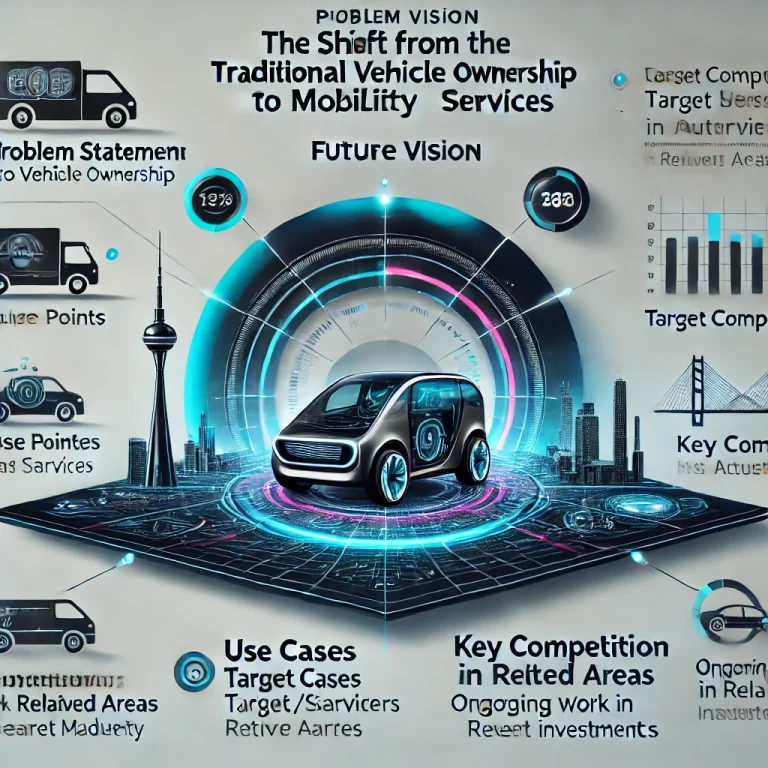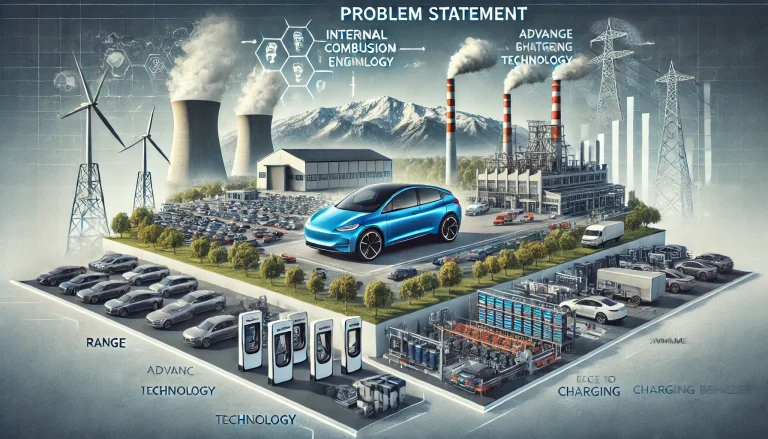Problem Statement
The automotive supply chain is a complex and global network, involving multiple stakeholders, from raw material suppliers to manufacturers, distributors, and retailers. Ensuring transparency, traceability, and efficiency across this supply chain is a significant challenge. Issues such as counterfeiting, regulatory compliance, and inefficiencies in tracking materials and components can lead to delays, increased costs, and potential safety risks.
Blockchain technology is emerging as a powerful solution to address these challenges. By providing a decentralized and immutable ledger, blockchain can enhance transparency and traceability across the automotive supply chain. This technology enables all participants in the supply chain to access a shared and trusted record of transactions, reducing the likelihood of fraud, errors, and discrepancies.
One of the key benefits of blockchain in the automotive supply chain is its ability to track the provenance of materials and components. By recording every transaction on the blockchain, from the sourcing of raw materials to the final assembly of vehicles, manufacturers can ensure that all parts are authentic and comply with industry standards. This traceability is particularly important for high-value components and materials, where counterfeiting is a major concern.
Blockchain also plays a critical role in ensuring compliance with regulations. Automotive manufacturers must adhere to a wide range of regulations, including environmental standards, safety requirements, and labor laws. With blockchain, compliance data can be recorded and verified in real-time, making it easier for manufacturers to demonstrate adherence to regulations and avoid costly penalties.
Additionally, blockchain can streamline processes and reduce inefficiencies in the supply chain. Traditional supply chain management often involves manual record-keeping and paperwork, which can lead to delays and errors. Blockchain automates these processes, providing real-time visibility into the status of materials and components as they move through the supply chain. This increased efficiency can lead to faster production times, reduced costs, and improved overall supply chain performance.
However, implementing blockchain technology in the automotive supply chain is not without challenges. The integration of blockchain with existing systems requires significant investment and collaboration among all stakeholders. Additionally, there are concerns around data privacy, scalability, and the standardization of blockchain protocols across the industry.
To fully realize the benefits of blockchain, the automotive industry must address these challenges and foster a collaborative approach to blockchain adoption. By doing so, manufacturers can enhance the transparency, traceability, and efficiency of their supply chains, ultimately delivering higher quality products to consumers and building trust in the global automotive market.
Pain Points
- Complexity of Supply Chain: Managing a global network with multiple stakeholders, leading to potential delays, errors, and inefficiencies.
- Counterfeiting and Fraud: Risk of counterfeit parts entering the supply chain, affecting product quality and safety.
- Regulatory Compliance: Ensuring adherence to a wide range of regulations, including environmental standards and safety requirements.
- Manual Record-Keeping: Reliance on manual processes and paperwork, leading to delays, errors, and increased costs.
- Lack of Traceability: Difficulty in tracking the provenance of materials and components, leading to potential quality and safety issues.
- Data Privacy Concerns: Protecting sensitive information while ensuring transparency across the supply chain.
- Scalability: Implementing blockchain technology on a large scale across a global supply chain.
- Standardization of Protocols: Ensuring that blockchain protocols are standardized and compatible across different stakeholders in the supply chain.
- Investment and Collaboration: Significant investment and collaboration required for the successful integration of blockchain technology.
- Trust and Adoption: Building trust among stakeholders and encouraging widespread adoption of blockchain technology in the automotive industry.

Future Vision
Our platform envisions a future where blockchain technology is fully integrated into the automotive supply chain, revolutionizing how materials and components are tracked, verified, and managed. By leveraging blockchain, the automotive industry can achieve unprecedented levels of transparency, traceability, and efficiency, ensuring that every part of the supply chain is secure, compliant, and optimized for performance.
The platform will support the implementation of blockchain technology by providing tools and resources for tracking the provenance of materials and components. This includes creating a decentralized ledger that records every transaction in the supply chain, from raw material sourcing to final vehicle assembly. Manufacturers will be able to verify the authenticity of parts, reduce the risk of counterfeiting, and ensure compliance with industry standards.
To address regulatory compliance, the platform will offer real-time data recording and verification capabilities, enabling manufacturers to easily demonstrate adherence to environmental, safety, and labor regulations. This will not only reduce the risk of penalties but also enhance the reputation of manufacturers as leaders in compliance and ethical practices.
Efficiency in the supply chain will be enhanced through the automation of processes and real-time visibility into the movement of materials and components. The platform will provide a transparent view of the supply chain, allowing manufacturers to identify and address bottlenecks, reduce delays, and optimize production times. This increased efficiency will lead to cost savings and improved supply chain performance.
Data privacy and security will be prioritized, with the platform offering encryption and access control measures to protect sensitive information while ensuring transparency. The platform will also work towards the standardization of blockchain protocols, ensuring that all stakeholders in the supply chain can seamlessly integrate and collaborate using the same technology.
Scalability will be achieved by developing blockchain solutions that are robust enough to handle the demands of a global supply chain. The platform will provide support for the integration of blockchain with existing systems, minimizing disruption and facilitating a smooth transition to the new technology.
Collaboration and trust among stakeholders will be fostered through the platform’s emphasis on transparency and shared benefits. By demonstrating the value of blockchain in improving supply chain management, the platform will encourage widespread adoption and build trust across the industry.
Through these strategies, the platform will enable the automotive industry to fully harness the power of blockchain, transforming the supply chain into a secure, transparent, and efficient system that delivers high-quality products to consumers and drives innovation in the market.
Use Cases
- Provenance Tracking: Implementing blockchain to track the origin and movement of materials and components throughout the supply chain.
- Anti-Counterfeiting Measures: Using blockchain to verify the authenticity of parts and reduce the risk of counterfeit components entering the supply chain.
- Regulatory Compliance Verification: Automating the recording and verification of compliance data to ensure adherence to environmental, safety, and labor regulations.
- Supply Chain Transparency: Providing real-time visibility into the status of materials and components, allowing manufacturers to identify and address bottlenecks.
- Data Privacy and Security: Protecting sensitive information through encryption and access control while maintaining transparency across the supply chain.
- Standardization of Blockchain Protocols: Developing and implementing standardized blockchain protocols that are compatible across all stakeholders in the supply chain.
- Scalable Blockchain Solutions: Creating blockchain technology that can be scaled to handle the demands of a global automotive supply chain.
- Collaboration and Trust Building: Encouraging collaboration among stakeholders by demonstrating the shared benefits of blockchain technology in the supply chain.
- Efficiency Optimization: Automating processes and reducing manual record-keeping to improve supply chain efficiency and reduce costs.
- Fraud Reduction: Enhancing the security of the supply chain by using blockchain to detect and prevent fraudulent activities.
Target Users and Stakeholders
- User: Automotive Manufacturers, Supply Chain Managers, Compliance Officers, IT Security Teams, and Blockchain Developers
- Age Group: 30-60 years
- Gender: M/F
- Usage Pattern: Regular usage for integrating blockchain technology into the supply chain, ensuring transparency, traceability, and efficiency
- Benefit: Enhanced ability to track materials, verify authenticity, ensure compliance, and reduce inefficiencies and fraud in the supply chain
- Stakeholders:
- Automotive Manufacturers: Companies involved in the production and assembly of vehicles, seeking to improve supply chain transparency and efficiency.
- Suppliers: Providers of materials and components used in automotive manufacturing, playing a critical role in the supply chain.
- Regulatory Bodies: Agencies responsible for setting and enforcing standards in the automotive industry, including environmental, safety, and labor regulations.
- Technology Providers: Companies offering blockchain solutions, cybersecurity measures, and integration services tailored to the automotive supply chain.
- Customers: Consumers and businesses seeking vehicles made with high-quality, authentic parts and components, with a focus on transparency and ethical practices.
Key Competition
- IBM Blockchain: Offers blockchain solutions for supply chain transparency, traceability, and efficiency, with a focus on provenance tracking and regulatory compliance.
- VeChain: Specializes in blockchain technology for supply chain management, providing tools for tracking the origin and movement of materials and components.
- Provenance: Provides blockchain-based solutions for verifying the authenticity of products and ensuring compliance with industry standards.
- Everledger: Focuses on using blockchain to enhance transparency and reduce fraud in supply chains, particularly in high-value industries like automotive.
- Modum: Offers blockchain solutions that integrate with IoT devices to provide real-time monitoring and verification of supply chain activities.
Products/Services
- IBM Blockchain for Supply Chain: Providing blockchain solutions that enhance transparency, traceability, and efficiency in the automotive supply chain.
- VeChain Provenance Tracking: Specializing in blockchain technology for tracking the origin and movement of materials and components in the supply chain.
- Provenance Authenticity Verification: Offering blockchain-based solutions for verifying the authenticity of products and ensuring compliance with industry standards.
- Everledger Supply Chain Transparency: Using blockchain to enhance transparency and reduce fraud in the automotive supply chain.
- Modum IoT Integration: Providing blockchain solutions that integrate with IoT devices to monitor and verify supply chain activities in real-time
Active Startups
- BlockAuto: Specializes in blockchain solutions for the automotive industry, focusing on provenance tracking and anti-counterfeiting measures.
- ChainVerify: Offers blockchain-based tools for verifying the authenticity of automotive parts and ensuring compliance with industry regulations.
- TranspareChain: Provides blockchain technology that enhances supply chain transparency and reduces inefficiencies in the automotive industry.
- TrustParts: Focuses on using blockchain to verify the origin and quality of materials and components in the automotive supply chain.
- ReguChain: Specializes in blockchain solutions for automating regulatory compliance verification in the automotive supply chain.
- SupplyGuard: Offers blockchain-based fraud detection and prevention tools tailored to the automotive industry.
- EcoTrack: Develops blockchain solutions that track the environmental impact of materials and components throughout the supply chain.
- SecureChain: Provides blockchain solutions that enhance data privacy and security in the automotive supply chain while maintaining transparency.
- ChainScale: Focuses on creating scalable blockchain technology that can be integrated into global automotive supply chains.
- CollaborateChain: Encourages collaboration among stakeholders by providing blockchain solutions that demonstrate the shared benefits of supply chain transparency.
Ongoing Work in Related Areas
- Provenance Tracking Research: Exploring new methods and technologies for tracking the origin and movement of materials and components in the automotive supply chain.
- Blockchain for Anti-Counterfeiting: Developing blockchain-based solutions to verify the authenticity of parts and reduce the risk of counterfeit components.
- Regulatory Compliance Automation: Innovating tools and resources for automating regulatory compliance verification using blockchain technology.
- Supply Chain Transparency Innovations: Researching and developing new approaches to enhancing transparency and efficiency in the automotive supply chain through blockchain.
- Data Privacy and Security in Blockchain: Ensuring that blockchain technology protects sensitive information while maintaining transparency in the supply chain.
- Scalable Blockchain Solutions: Developing blockchain technology that can be scaled to handle the demands of a global automotive supply chain.
- Standardization of Blockchain Protocols: Innovating in the standardization of blockchain protocols to ensure compatibility across all stakeholders in the supply chain.
- Efficiency Optimization in Supply Chains: Exploring strategies for automating processes and reducing manual record-keeping to improve supply chain efficiency.
- Fraud Detection and Prevention with Blockchain: Researching blockchain-based tools for detecting and preventing fraudulent activities in the supply chain.
- Environmental Impact Tracking: Developing blockchain solutions that track and reduce the environmental impact of materials and components in the automotive supply chain.
Recent Investment
- BlockAuto: $40M in Series B funding led by blockchain-focused venture capital firms, January 2022.
- ChainVerify: $35M in Seed funding from automotive technology investors, March 2021.
- TranspareChain: $30M in Series A funding from supply chain management-focused investors, June 2022.
- TrustParts: $28M in Series A funding from anti-counterfeiting technology investors, October 2021.
- ReguChain: $25M in Seed funding from regulatory compliance and blockchain investors, December 2021.
Market Maturity
The market for blockchain solutions in the automotive supply chain is rapidly maturing as manufacturers and suppliers recognize the transformative potential of this technology. Companies like IBM, VeChain, and Provenance are leading the way with innovative blockchain applications that enhance transparency, traceability, and efficiency in the supply chain. Startups such as BlockAuto, ChainVerify, and TranspareChain are driving innovation in provenance tracking, anti-counterfeiting measures, and regulatory compliance verification. Significant investments in blockchain research, data privacy, and scalable solutions are transforming the automotive supply chain, enabling manufacturers to reduce inefficiencies, ensure compliance, and build trust with consumers. As the market continues to evolve, we expect to see more integrated and advanced blockchain solutions that revolutionize the automotive supply chain and set new standards for transparency and efficiency.
Summary
Blockchain technology is being explored to enhance transparency, traceability, and efficiency in the automotive supply chain. It can help track the provenance of materials, ensure compliance with regulations, and reduce fraud. Our proposed platform leverages provenance tracking, anti-counterfeiting measures, regulatory compliance verification, supply chain transparency, data privacy and security, standardization of blockchain protocols, scalable blockchain solutions, collaboration and trust building, efficiency optimization, and fraud reduction to address these challenges. Key pain points include the complexity of the supply chain, counterfeiting and fraud, regulatory compliance, manual record-keeping, lack of traceability, data privacy concerns, scalability, standardization of protocols, investment and collaboration, and trust and adoption.
Target users include automotive manufacturers, supply chain managers, compliance officers, IT security teams, and blockchain developers, with stakeholders encompassing automotive manufacturers, suppliers, regulatory bodies, technology providers, and customers. Key competitors like IBM, VeChain, Provenance, Everledger, and Modum offer various blockchain solutions for supply chain transparency, traceability, and efficiency, while startups such as BlockAuto, ChainVerify, and TranspareChain are driving innovation in provenance tracking, anti-counterfeiting measures, and regulatory compliance verification. Recent investments highlight significant interest and growth potential in platforms addressing the challenges of blockchain integration in the automotive supply chain.
By addressing these challenges and implementing innovative blockchain strategies, the automotive industry can revolutionize its supply chain, ensuring that every part is authentic, compliant, and delivered efficiently to consumers.



